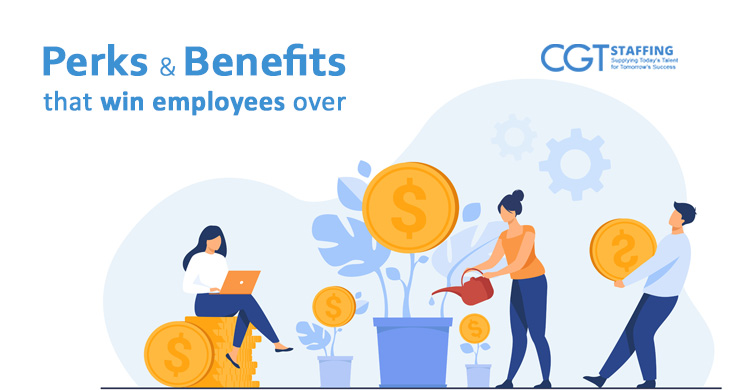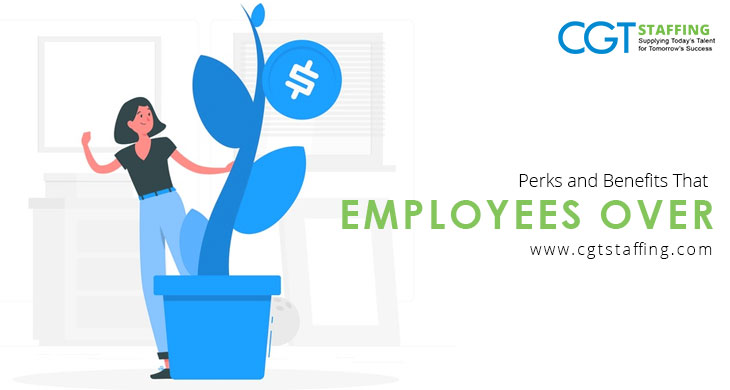Even during a pandemic, most employees are still working for the majority of their waking hours during the week. For those that have side-gigs, second-jobs, or a particularly challenging juggle between career and family, this may extend to over half of the entire week. While workers may not complain and may even enjoy their work enough to not mind the load, the stress and exhaustion are still real.
In extreme cases, this can render an employee incapable of staying in their role. But even in better scenarios, it will inevitably chip away at their motivation and still interfere with work (although on a smaller scale). Employee turnover is expensive, and demotivated employees are not likely to stay with your firm for long. Unless, of course, you offer them the right motivation.
Table of Contents
Using Perks and Benefits to Motivate Employees
Employee motivation is one of the most crucial components of business success. Most businesses have an HR function that focuses on hiring, recruitment, onboarding, and working with third-party partners like a staffing agency.
However, smart businesses also understand that it is much cheaper to motivate and retain employees than to hire new ones. That is why workforce managers often find that the right perks and employee benefits can keep employees motivated far better than their compensation.
How are these effective motivating factors? One could argue that they are visible far more frequently and in a more obvious way than the usual monetary compensation and encourage employee retention. One could also argue that they serve as a goal or an objective for other employees might aspire to and thereby work harder.
Furthermore, recruiters, like those that offer medical staffing solutions, can use them to attract better candidates. So while offering the perks and benefits may cost the company a bit more, they serve as positive reinforcement to improve productivity and output. Ultimately, this will translate into more profits. However, you still need to know what perks and benefits work the best.

Employment Benefits That Boost Motivation in 2021
Benefits are often confused with perks, but they aren’t the same thing. Benefits are actually part of the overall compensation offered to an employee. However, unlike monetary compensation, employee benefits are typically noncash or in-kind. Usually determined in advance, including the right employee benefits can both boost the success of your talent acquisition strategies as well as of your workforce motivation efforts. These benefits appeal to workers because that means they don’t have to fund things like:
Health Coverage or Insurance
Health insurance typically is among the most (if not the most) desired benefits from an employee standpoint. Consider the cost of healthcare in many parts of the United States. The rising costs of medical coverage and healthcare can often be inaccessible to a large percentage of American workers.
Therefore, employers that offer health insurance along with monetary compensation are automatically more desirable to a candidate or an existing employee.
Dental Coverage or Insurance
Dental coverage is usually separate from general health coverage. But it is still a valuable benefit that can motivate employees to stick with you and work harder. Dental needs, unless unhygienic or painful, are rarely relevant to an employee’s ability to perform. However, dental work is expensive.
Employees who need braces for a child, or a root canal for themselves may end up paying thousands of dollars for dental care. But if you highlight dental insurance as part of a role’s compensation and benefits, you can be sure it adds to the worker’s motivation.
Paid Leaves and Vacation Time
Paid leaves are a hugely appealing benefit with any role. Paid time off is essential for employees to recuperate, spend time with family, and avoid burning out or over-exhausting themselves. They may also have to take emergency leaves, such as for medical reasons, bereavement, or even the odd casual day off.
However, it’s not always necessary for an employer to offer paid leaves. Or it may only allow them under certain circumstances. But a good paid leave policy can be a huge motivating factor to many workers, especially during the pandemic.
401k or Similar Retirement Plans
Workers don’t stay young and productive forever. Many may have to retire for health reasons. Others may have to follow the statutory retirement age applying to their place of business. Whatever the case, life after retirement usually implies the employee won’t be working anymore.
Sadly, many employment options barely offer a living age, let alone something to live off of after retirement. With most workers looking for security after they are too old to work, a benefit like a pension plan or a 401k account can be a solid reason to commit to you as an employer.
Employee Perks That Employees Appreciate in 2021
Perks are what are known as “over and above” the compensation and benefits. These aren’t usually a standard part of the role everywhere in the industry. But they are still nice to have, especially for the workers who get them. Perks serve as a differentiating factor adding to your employer brand. This makes you a more appealing employer than your competition and good reasons for employees to stay long-term. Popular perks include:
- Flexible hours and remote working options.
- Paid parental (maternal and/or paternal) leaves.
- Employee discounts, freebies, and reduced prices.
- Offering separate time off for volunteer work from regular leaves.
Perks and benefits can also help you in reaching out to a larger candidate pool. Offsite recruiters, such as a partner staffing agency in Houston may find it much easier to pitch you as a credible and appealing employer to candidates that don’t know your brand. Moreover, it increases your chances of acquiring and retaining younger talent that give weight to these perks and benefits.
